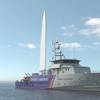DNO Eyes First Kurdistan Crude Shipment
Norwegian firm DNO expects its first shipment of oil from Kurdistan to be sold on the international market by the end of the year and said it was committed to its operations in the region despite the recent flare-up in violence.
The firm could until recently only sell oil on the local Iraqi market, at lower prices than it would have got on the international oil market, due to a long constitutional fight between the region and Baghdad over independent oil sales.
That changed earlier this month when the Kurdish Regional Government allowed oil firms to seek out international buyers. Oil revenue is a lifeline for the KRG, whose peshmerga fighters are fighting Islamic State militants.
"I would be disappointed if by the end of the year we haven't begun to sell oil to international markets on some ongoing basis," DNO executive chairman, Bijan Mossavar-Rahmani, told Reuters after presenting the firm's second-quarter results.
He declined to say if DNO had talked to international buyers over shipping its oil. Average second quarter output at its prize field in the region, Tawke, was 110,000 barrels per day.
"Volumes are driven by tankers. Typically, they are a million barrels so from Tawke's point of view that is 6-7 days of production," he said.
Crude oil flow on Kurdistan's pipeline to Turkey resumed this week after upgrade work and is running at an increased rate of 200,000 bpd. So far, 7.8 million barrels of Kurdish oil have flowed through the independent pipeline, of which 6.5 million have been loaded onto tankers for export.
DNO said it had not been able to record revenues for 2.2 million barrels of Tawke oil which was piped into Turkey for onward transfer to the Mediterranean export terminal at Ceyhan.
Earlier this month Reuters reported that Iraqi Kurdistan was starting to find more buyers for oil now being delivered by the pipeline after struggling to sell the initial cargoes due to objections from Baghdad.
SECURITY
Islamic State fighters have advanced into Kurdistan this month, coming within a half hour's drive of Arbil, the capital of the region and a hub for some oil companies.
As a result, a number of energy firms have shut production and evacuated all their staff. But not DNO, which brought in staff from Oslo and Dubai to reinforce operations, and said it remained committed to working in the region.
"Some people have requested to leave, especially British contractors, because the Foreign Office put up a notice for British subjects to leave Kurdistan," said Mossavar-Rahmani.
"But we have had others going in as some were leaving. We have been comfortable with the security arrangements in place."
DNO had stepped up security protocols and retained key operational staff, he said.
DNO said a number of its suppliers and contractors have halted operations and left the country, so it will shift to work with local suppliers, although it realises progress on some work will be affected by factors beyond its control.
"Operations at Tawke field have continued without interruption and the Tawke expansion programme is on track, though we recognise that the timing of some projects across our three Kurdistan blocks are likely impacted by developments beyond our control," the firm said in a statement.
Reporting second-quarter results on Thursday, DNO posted earnings just short of expectations with net profit down 7.5 percent at $44.4 million, below the average forecast of $45 million given in a poll of analysts.
DNO's oil production surged in the second quarter as Tawke output rose 78 percent on the previous three months to 81,669 barrels of oil equivalents per day, above forecasts for 70,942 boepd.
Shares in DNO were down 0.5 percent at 1132 GMT, lagging an Oslo benchmark index up 0.61 percent.
Reporting by Gwladys Fouche and Balazs Koranyi













